Christian History
Who Were the Reformers & Evangelists Who Laid American’s Foundation?

Christian History “My people are destroyed for lack of knowledge.” Hosea 4:6 |

|
It all started on OCTOBER 31, 1517, an Augustinian monk named Martin Luther posted 95 debate questions or “theses” on the door of Wittenberg Church, which began the movement known as “the Reformation.” Luther’s initial objection was to the methods employed by Johann Tetzel selling indulgences to get people out of a so-called purgatory. Luther expected a small little debate between he and a couple other monks who might defend what the Roman Catholics were doing in fleecing the people. But when the people learned this was not biblical, and Luther himself got saved through faith alone in Christ Jesus and began to preach this – the whole thing went viral! Thousands were leaving the Roman Catholic church having faith only in Jesus Christ for salvation. This was causing a national spiritual/cultural revolution.
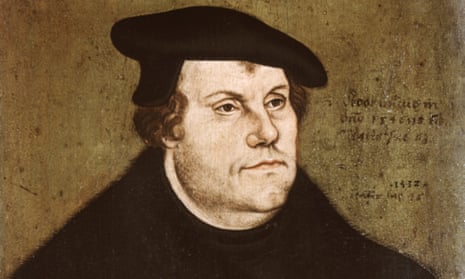
The Pope was demanding something be done. In 1521, 34-year-old Martin Luther was summoned to stand trial before the most powerful man in the world, 21-year-old Holy Roman Emperor Charles V. Charles V of Spain had an empire that spanned nearly 2 million square miles. The sun never set on the Spanish Empire. It included lands from Europe to the Netherlands, to the Far East, North and South America, and to the Caribbean. The Philippine Islands were named after his son, King Philip II of Spain.
At the trial, called the Diet of Worms, Charles V initially dismissed Luther’s theses as “an argument between monks.” Luther was ordered to recant without having had his theses addressed. Luther asked to have overnight to give his answer, knowing to not recant may mean immediate death. The next day standing before the world, Luther only said: “Here I stand; I can do no other. God help me. Amen.”
Luther was allowed to leave not knowing what would happen next. Soon after Luther rode out of town with his supporting escorts, masked horsemen rode up surrounding the group and kidnapped Luther, riding off with him into the woods. His group thought he was dead now and Luther no doubt thought the same. But as it turned, Frederick III of Saxony had his men kidnap Luther for his own safety and hid Luther in his own castle in Wartburg. They dressed him in knight’s cloths and gave him a different name. But during the half year that Luther was there he translated the New Testament into the German language. The Bible then in their own language catapulted the reformation.
But Luther was not the only reformer. Thomas Muntzer and “the three prophets from Zwickau” Germany – Storch, Drechsel and Stubner – were especially influential in rousing the spiritual revolution in Germany. But they were in conflict with Luther who believed in state church and infant baptism. Whereas the Zwickau reformers believed in adult immersion baptism after salvation and a “Believer’s Church”, unlike Luther’s state church belief or the state Roman Catholic church. The Zwickau reformers also believed in the Christian rapture as in 1Thessalonians 4:15-18, as well as the eminent return of Christ, unlike some today who falsely claim that John Derby was the first to teach about the Christian rapture. Moreover, some historians believe the Zwickau reformers were even the precursor for the Anabaptists reformers and the Zwingli reformers in Zurich Switzerland.
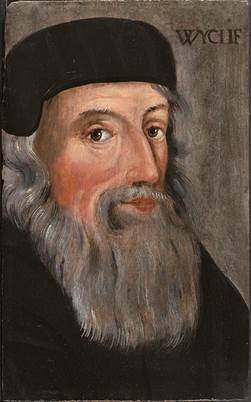
John Wycliff was the earliest reformer in the 14th century and has therefore been called the “The Morning Star of the Reformation”. He lived in England and was the first to translate the Bible into English. The General Prologue of Wycliffe’s 1384 translation of the Bible has this inscription: “The Bible is for the Government of the People, by the People, and for the People.”
But what made the Lutheran reformers more successful than earlier reformers in turning nations into Christian nations was not the pulpit but Luther’s dominance in using new media – the printing press. Johannes Gutenberg in the 15th century invented the Western world’s first moveable-type printing press. The first book of significance ever printed was the 42-line Gutenberg Bible, known as the Mazarin Bible, in 1455.
The spiritual warfare going on in the heavenly realm was being played out on earth at this time with national Christian reformation advancements vs national Islamic advancement. Muslim leader, Sultan Suleiman the Magnificent (1494-1566), his Ottoman fleet dominated the Mediterranean Sea, the Red Sea and the Persian Gulf. Suleiman conquered into Christian Hungary, Christian Serbia, and Christian Austria, in addition to controlling the Middle East and North Africa.
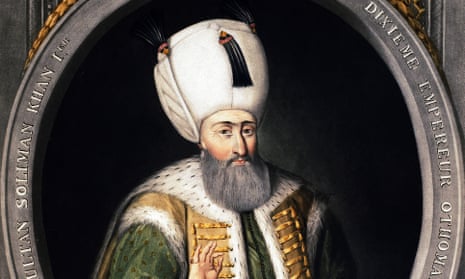
Deuteronomy 28 lists national blessings and cursings: If a nation “shall hearken diligently unto the voice of the Lord thy God … all these blessings shall come on you.” But if a nation does not hearken to the voice of the Lord, “all these curses shall come upon you,” including: “The foreigners (non-believers) that are within you shall get up above you very high; and you shall come down very low … and they shall pursue you, and overtake you, till you be destroyed.” How did God judge Ancient Israel when it sinned? He let the foreigners (non-believers) invade: Philistines, Edomites, Moabites, Ammonites. Egyptians, Assyrians Babylonians, etc. When Israel repented, God raised up deliverers. This has been happening throughout history and especially evident where Christendom has been evident.
Martin Luther referenced this time: “The Turk is the rod of the wrath of the Lord our God … If the Turk’s god, the devil, is not beaten first, there is reason to fear that the Turk will not be so easy to beat … Christian weapons and power must do it … it must begin with our repentance, and we must reform our lives, or we shall fight in vain. The Church must drive men to repentance by showing our great and numberless sins and our ingratitude, by which we have earned God’s wrath and disfavor, so that He justly gives us into the hands of the devil and the Turk.”
As the Islamic threat intensified, reformer John Calvin wrote to Philip Melanthon in 1543: “I hear of the sad condition of your Germany! … The Turk again prepares to wage war with a larger force. Who will stand up to oppose his marching throughout the length and breadth of the land, at his mere will and pleasure?”
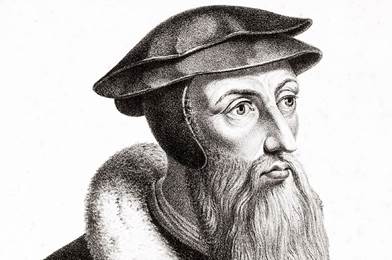
Followers of the reformers who publicly “protested”, were generally referred to as “Protestants.” Such notable Protestant Reformers included: John Calvin, Thomas Crammer, John Knox, Philip Melanchthon, William Tyndale, Huldrych Zwingli.
Some of the Protestant countries were eventually recognized no longer as Roman Catholic but rather Protestant and in so being helped Charles V in defending Europe from the Muslim invasion and ultimately saving Europe for Christendom, otherwise America today may have been another oppressive Muslim nation.
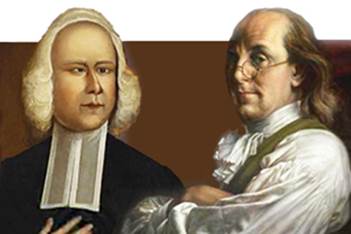
Luther influenced John Wesley, who influenced George Whitefield, who preached the Great American Awakening in Colonial America. Whitefield set the American spiritual stage for the American War of Independence unlike anyone else at that time. He was in every newspaper and even Benjamin Franklin wanted Whitfield to go with him to start a new city and colonial territory in the northwest territory. Whitefield webbed the colonies together unlike any other American at that time and was far better known in every colony in America than any other man at the time, even than George Washington. But most off, he established American citizenry as a Christian America.
New York University Professor Emeritus Patricia Bonomi wrote: “The colonists were about 98 percent Protestant.” One to two percent of America’s population at the time of the founding were Catholic, and one-tenth of a percent were Jewish. The 56 signers of the Declaration were predominantly Protestant, with a notable exception being Catholic Charles Carroll of Maryland.
Edmund Burke, British Statesman, addressed Parliament in 1775: “All Protestantism … is a sort of dissent. But the religion most prevalent in our Northern Colonies is a refinement on the principle of resistance; it is the dissidence of dissent, and the protestantism of the Protestant religion.”
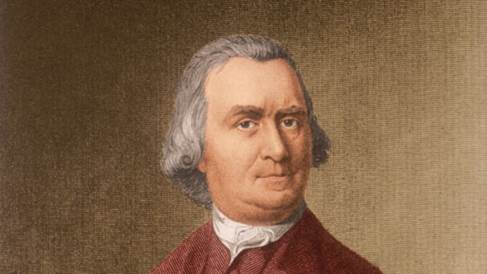
Samuel Adams stated when he signed the Declaration of Independence: “This day, I trust, the reign of political protestantism will commence.”
John Adams wrote in 1765: “Desire of dominion … becomes an encroaching, grasping, restless, and ungovernable power … Tyranny, cruelty, and lust … was soon adopted by almost all the princes of Europe … The people were held in ignorance … until God in his benign providence raised up the champions who began and conducted the Reformation. From the time of the Reformation to the first settlement of America, knowledge gradually spread in Europe, but especially in England; and in proportion as that increased and spread among the people … tyranny … lost … strength.
Consistent with Adams’ view are those of Robert D. Woodberry of the National University of Singapore, who wrote a paper titled “The Missionary Roots of Liberal Democracy.” Woodberry demonstrated statistically that countries where Protestant “conversionary” missionaries went to in the 19th century became more prosperous in the 20th century: “The association between Protestant missions and democracy is consistent in different continents and subsamples, and it is robust to more than 50 controls and to instrumental variable analyses.”
Luther wrote: “I am much afraid that schools will prove to be the great gates of hell unless they diligently labor in explaining the Holy Scriptures, engraving them in the hearts of youth. I advise no one to place his child where the scriptures do not reign paramount. Every institution in which men are not increasingly occupied with the Word of God must become corrupt.”
Luther also wrote before he died in 1546: “If I profess with the loudest voice and the clearest exposition every portion of the truth of God, except precisely that little point which the world and the devil are at that moment attacking, I am not confessing Christ, however boldly I may be professing Christ. Where the battle rages, there the loyalty of the soldier is proved, and to be steady on all the battlefield besides is mere flight and disgrace if he flinches at that point.”
“To reject the Law is to praise the wicked; to obey the Law is to fight them.”
(Prov. 28:4)
Read early American Christian history relevant for action today in Jim’s book – Christian Manifesto (Vol. 1) at: www.JimsBookstore.com
If you know someone who might like to receive this periodic Christian History send us their email and we’ll send it to them as well. Presently we have almost 500 people who receive Christian History. Help us grow it to over 500 this month. We aim for Christian historical motivational relevance for our times. God said, “My people are destroyed for lack of knowledge” (Hosea 4:6). And “Readers are Leaders!”
[This blog is free to share if forwarded in its entirety.]
